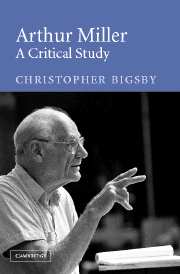Book contents
- Frontmatter
- Contents
- Acknowledgements
- Note on the text
- Introduction
- 1 The Michigan plays
- 2 The Golden Years, The Half-Bridge, Boro Hall Nocturne
- 3 The radio plays
- 4 The Man Who Had All the Luck
- 5 Focus
- 6 All My Sons
- 7 Death of a Salesman
- 8 Arthur Miller: time-traveller
- 9 An Enemy of the People
- 10 The Crucible
- 11 A Memory of Two Mondays
- 12 A View from the Bridge
- 13 Tragedy
- 14 The Misfits
- 15 After the Fall
- 16 Incident at Vichy
- 17 The Price
- 18 The Creation of the World and Other Business
- 19 The Archbishop's Ceiling
- 20 Playing for Time
- 21 The shearing point
- 22 The American Clock
- 23 The one-act plays: Two-Way Mirror, and Danger: Memory!
- 24 The Ride Down Mount Morgan
- 25 The Last Yankee
- 26 Broken Glass
- 27 Mr Peters' Connections
- 28 Resurrection Blues
- 29 Finishing the Picture
- 30 Fiction
- 31 Arthur Miller as a Jewish writer
- Notes
- Index
22 - The American Clock
Published online by Cambridge University Press: 16 November 2009
- Frontmatter
- Contents
- Acknowledgements
- Note on the text
- Introduction
- 1 The Michigan plays
- 2 The Golden Years, The Half-Bridge, Boro Hall Nocturne
- 3 The radio plays
- 4 The Man Who Had All the Luck
- 5 Focus
- 6 All My Sons
- 7 Death of a Salesman
- 8 Arthur Miller: time-traveller
- 9 An Enemy of the People
- 10 The Crucible
- 11 A Memory of Two Mondays
- 12 A View from the Bridge
- 13 Tragedy
- 14 The Misfits
- 15 After the Fall
- 16 Incident at Vichy
- 17 The Price
- 18 The Creation of the World and Other Business
- 19 The Archbishop's Ceiling
- 20 Playing for Time
- 21 The shearing point
- 22 The American Clock
- 23 The one-act plays: Two-Way Mirror, and Danger: Memory!
- 24 The Ride Down Mount Morgan
- 25 The Last Yankee
- 26 Broken Glass
- 27 Mr Peters' Connections
- 28 Resurrection Blues
- 29 Finishing the Picture
- 30 Fiction
- 31 Arthur Miller as a Jewish writer
- Notes
- Index
Summary
Miller entered the 1980s with a play that looked back to the 1930s, to the era of the Depression and to his own first work, No Villain. He began work on it in the early 1970s but it was first produced at the Spoleto Festival's Dockside Theatre in Charleston, South Carolina, on 24 May 1980. It came to the Biltmore Theatre in New York on 20 November of the same year. It was not well received, or, rather, as Miller somewhat bitterly lamented, it closed after a few days, despite playing to nearly full houses, because the producer ran out of money to advertise its existence.
In 1984 it opened at the Mark Taper Forum, in a revised version and then, in 1986, at the National Theatre in London, where it was not only a considerable success but also found the style that had evaded its first American directors. Perhaps, too, the changed political situation (Thatcher was in power in England; Reagan in America) gave an edge to a play that recalled the fragility of the social world. In a decade in which Thatcher memorably insisted that there was no such thing as society, Miller chose both to celebrate a sense of shared experience and to recall the necessity for bedrock values, though not without an awareness of the problematics of summoning up a past reinvented by memory.
However, Thatcher's view was not so remote from that which had prevailed in America until the New Deal.
- Type
- Chapter
- Information
- Arthur MillerA Critical Study, pp. 337 - 351Publisher: Cambridge University PressPrint publication year: 2004



